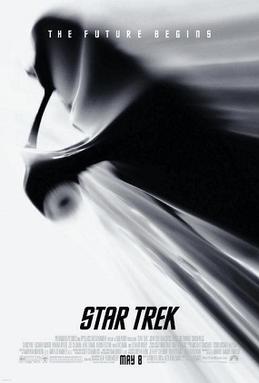In this reboot of the iconic sci-fi franchise, Cpt. Nero (Eric Bana) a renegade Romulian, destroys a Federation starship, killing Capt. George Kirk (Chris Hemsworth) in the process. George’s son, James (Chris Pine), grows up a headstrong rebel in the midwest. Eventually, he joins Starfleet and ends up on the Enterprise alongside Dr. Leonard McCoy (Karl Urban), translator Uhara (Zoe Saldana), pilot Hiraku Sulu (Jonathan Cho), navigator Pavel Chekov (Anton Yelchin) and ultra-logical half-Vulcan Cmdr. Spock (Zachary Quinto). Together, they must stop Nero from destroying the Federation planet by planet.
As a movie, Star Trek leaves a lot to be desired. As with many so-so films, the script is the chief culprit. The plot manages to blend the metaphysical confusion of time travel with an overly simplistic revenge story. Characterization is nothing if not thin and predictable. The rebellious Kirk shows up on a motorcycle at one point (clichéd much?) and even as his character supposedly matures under pressure, we don’t see him actually undergo much of an internal change. Likewise, Spock’s supposed intelligence and rationality is undermined by his inability to adapt to remarks about his mother (portrayed briefly by a nearly unrecognizable Winona Ryder).
The acting is uneven, but less suspect. Simon Pegg is hilarious as engineer Montgomery Scott, Quinto makes the most of a difficult role and Leonard Nimoy is fun to watch as an aged version of his trademark character. Pine isn’t terrible in the lead, but he can’t help but seem inadequate. Ditto Bana – he brings some sympathy to a villainous role, but it’s still not enough to make Nero memorable. Both fare better than Soldana and Hemsworth though. The former is reduced to Object of the Hero’s Affection status, while the latter is embarrassingly wooden.
The one thing that action director J.J. Abrams did get completely right is the movie’s pace. Star Trek moves quickly without feeling rushed and there’s barely a wasted, extraneous moment to be found. Largely eschewing the CGI-happy antics of his contemporaries, Abrams also demonstrates that it’s possible to shoot a good-looking film the old-fashioned way.
It will undoubtedly thrill Trekkies to see this franchise given new life, but for those who didn’t have any investment in the TV series, there’s nothing exemplary here. Watch it, but don’t expect to go where no man has gone before.
6.5/10






